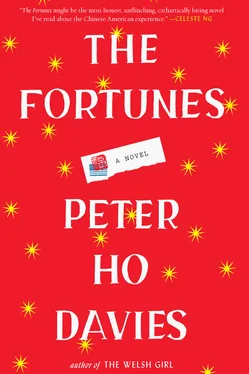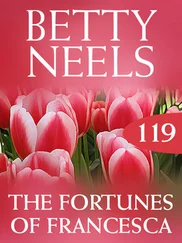He’s relieved when he sees the hotel bar still open, hurries into its hushed, shadowy embrace.
As much as he resents the other adopters, he knows they resent him too.
Bev suggested as much, albeit wistfully, when she confided in him over dinner one night, “Oh, how I envy you, John, and little Mei Mei. You’ll be able to take her out to the park, and parties, the mall, and not have everyone know she’s adopted. Even if you and Nola are together, people will think the little one is your own flesh and blood. That’ll make a difference, I reckon.”
(Bev told him another time that Lily loved helping out around the home. “Her favorite thing when she first came home with us was folding laundry. Imagine! My little Chinese laundry, I call her!” She laughed, and then covered her mouth as if to catch the words.)
John had nodded along with others around the table, and remembering it now, he finally grasps that all their study of things Chinese — all their acquisitions of scrolls and knickknacks (Eric and Scott have arranged for a rosewood dresser to be shipped to them in Seattle for their daughter’s room), which make him think of pet supplies to furnish a habitat — is a compensation for what he has: looking the part. And they know it too, and resent him for how easily it comes. In particular, he’s felt it when people ask how long the process has been for him and Nola.
Nine months, Nola says, proud of the symmetry. But everyone else has been waiting a year, eighteen months, two years in one case. “Serendipity, I guess,” Nola says, and it may be — a fluke of timing — but he knows the others suspect they got special treatment because he’s Chinese.
The only couple less liked on the tour are Norman and Amanda. They’re “preferential adopters,” as they’re quick to point out. “We could have kids of our own,” Amanda begins. “But why bring another life onto this overcrowded planet?” Norman finishes for her. It makes a kind of sense — John doesn’t disagree with them on the issue of overpopulation — and yet Norman’s righteousness grates. Other couples on the trip, after all, have tried very hard, gone to extreme lengths, to bring another life onto the planet. “It’s egotism, plain and simple,” Norman said the first night, “to want to perpetuate our own genes, and suicidal on a planetary, species-wide level.”
“Egotism indeed!” Nola fumed later in their room.
“Ignore him,” John counseled (the man has a receding hairline and a ponytail). But he can’t take his own advice. Norman fascinates him. Their fate, after all, is his choice, his principle.
“You share the Chinese government’s position on population then, the one-child policy?” he asked one morning over breakfast (toast for John, rice porridge for Norman), and Norman nodded sagely. “A regrettable necessity.” But this is a tricky response. They — their group as a whole — are beneficiaries, indirectly, of the policy, even if they mostly deplore it. Chinese families who can have only one child get rid of their girls — sometimes to orphanages, but sometimes by killing them, aborting them, or abandoning them after birth. The policy is in large part why they’re here, these Westerners, yet it’s also a source of heartbreak, broken homes and families. They are already practicing what they will tell the children they haven’t even received yet when they ask about their biological parents. For the sake of the kids, they don’t want to make these shadowy figures into villains (you can’t tell them they didn’t love them or didn’t want them, you have to say that they couldn’t keep them, the adoption books advise). Much easier to make the law the villain, the government. If they’re saving these children from something, it’s from the consequences of this law, and yet here they are, about to gain from it.
It’s a moral knot, but one that in Norman’s big hands seems to unravel, and the rest of them envy him this bluff confidence more than anything.
But John can’t let it lie. For him, the law isn’t the problem per se. The problem is that Chinese families want boys, a cultural phenomenon (albeit one hardly unique to the Chinese).
“But if you make Chinese culture the bad guy,” Nola observed back in their room — Norman having gone off exploring with Amanda—“you run the risk of alienating the girls from their heritage and potentially damaging their self-image.”
“But why,” John wanted to know, “should they have to maintain any connection with a culture that devalues them and has cast them out? Because they look Chinese is why,” he answered his own question. “Because we know they will look different and be treated as if they’re different in our society. We’re giving them something to fall back on when they’re discriminated against.”
“Oh, come on,” Nola hissed. “It’s not that bad.” (Nola, who had felt the need to warn her mother before she met John that he was half Chinese.)
“Really? You think if we were all in Romania now we’d be talking about keeping our kids connected to Romanian culture?” ( Are you sure he isn’t black? her mother replied.)
They’d fought in fierce whispers, not wanting anyone to hear them through the walls, the way they’d have sex if they ever had sex.
The whole “culture” thing, for John, is a defense against racism, an anticipation of it, but also perhaps in some obscure way a perpetuation of it. “If even their parents see them as other, what hope do these babies have of assimilating?”
“If you believe that,” Nola wailed, “why are we even here? If you had such a shitty childhood, why are we doing this?”
John wonders himself. Norman, he knows, would call this kind of thinking very Western. “The Chinese,” he has pointed out, “are matter-of-fact about adoption. They see it as practical… on the parents’ part. We need children to look after us in our old age.” He and Amanda laughed as if they couldn’t imagine ever growing old.
“What do you think about all this?” John asked Napoleon over lunch one day. They’d just watched the noodles they were eating being made — oohing and aahing at the show as if at a magic act, the noodles appearing from the twisted, stretched dough as if by sleight of hand — but now they paused in their slurping. Napoleon grinned at them. “Is good! Good for babies, good for mommies and daddies. Also more Chinese girls in America now, for Chinese American boys for marry.”
Such guileless, sunny chauvinism! It made John laugh, but only him.
“No offense, Miss Nola,” Napoleon said, small head bobbing birdlike on her slender neck. “You so ho leng, beautiful. Skin like white jade.”
Nola gave her bright, tight smile. “I don’t think John ever even dated a Chinese.”
“What? Really!” they asked. “Never?” And now, John thought, they were calling him racist, offended on behalf of their not-yet, not-quite daughters. “They were always going with white boys,” he said with a sour smile. “Aren’t all our desires racist in one way or another?”
They paused to watch the cook demonstrating how to make shaved noodles, slicing them off a long loaf of dough and flipping them acrobatically into the boiling water.
“Besides,” Norman said, changing the subject magisterially, “all this thinking is very twentieth-century. The pendulum is swinging back. Already boys outnumber girls in Chinese schools. Within a couple of decades the gender imbalance could be as much as twenty percent. What will all those boys do when it comes time to marry?” Eric and Scott exchanged a glance. “Maybe the girls will finally be valued for their scarcity.”
The little boys they’ve seen on the streets, in parks and pavilions, are often only children and plump (or just bundled up), and Jeannine has remarked that the little fatties, round as the blown-sugar animals they clutch, will be lucky to find wives. But John is an only child and was husky as a kid, and he finds himself feeling oddly sympathetic to the piggy-eyed, pink-cheeked brats.
Читать дальше












